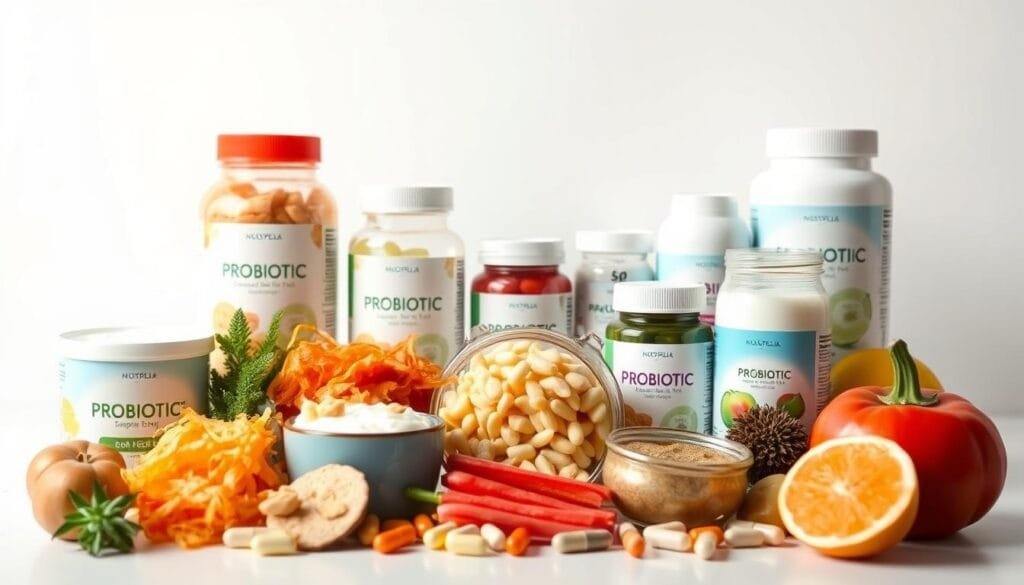Currently Empty: RM0.00
Trillions of tiny living organisms work daily to keep us healthy. These beneficial microorganisms, found in foods like yogurt and supplements, play a critical role in maintaining balance within our systems. When this balance falters, it can lead to digestive discomfort or weakened immunity.
The human microbiome acts like a bustling ecosystem. Helpful bacteria crowd out harmful ones, creating a natural defense. This interaction supports everything from nutrient absorption to mental well-being, making microbial harmony vital for overall health.
Research shows these live cultures strengthen intestinal barriers and regulate immune responses. They also produce compounds that fight inflammation. While fermented foods offer natural sources, supplements provide concentrated doses tailored to specific needs.
For personalized advice on selecting the right options, contact Wellness Concept at +60123822655. Their experts are available Monday-Friday (9:30 am-6:30 pm) and weekends (10 am-5 pm).
Key Takeaways
- Beneficial microorganisms help maintain balance in the body’s internal ecosystem
- A healthy microbiome supports digestion, immunity, and overall wellness
- Probiotic benefits vary by strain type and delivery method
- Both food sources and supplements can improve microbial diversity
- Professional guidance ensures optimal strain selection and usage
Understanding Probiotics and Their Health Benefits
Maintaining internal balance often starts with microscopic helpers. According to the World Health Organization, these live microbes must be consumed in adequate amounts to deliver measurable advantages. Specific strains like Lactobacillus acidophilus and Bifidobacterium breve thrive in fermented foods and supplements, each offering unique support.
What Are Probiotics?
True probiotic formulas contain carefully selected bacterial strains that survive digestion. For instance, L. acidophilus actively supports multiple areas – from oral health to urinary function. Quality matters: effective products specify strain types and colony-forming units (CFUs) per dose.
Key Health Benefits and Research Findings
Clinical studies highlight three core advantages. First, certain strains reduce diarrhea risks by 60% during antibiotic use. Second, they shorten cold durations by enhancing immune system responses. Third, emerging research connects specific microbes to improved mood and metabolic function.
For personalized strain recommendations, Wellness Concept’s experts (+60123822655) guide users through options available weekdays 9:30 am-6:30 pm and weekends 10 am-5 pm. Matching the right cultures to individual needs maximizes their health benefits.
How probiotics affect the body: Scientific Insights and Mechanisms
Within our systems, microscopic communities collaborate through sophisticated biochemical exchanges. These interactions create ripple effects across multiple body systems, particularly in the digestive tract. Researchers now understand these processes extend far beyond basic nutrient processing.

Interactions Within the Gut Microbiome
Beneficial strains engage in a dynamic balancing act with resident microbes. Specific Bifidobacterium varieties release substances that crowd out harmful bacteria while nourishing friendly counterparts. This teamwork strengthens intestinal barriers and optimizes nutrient absorption.
Some cultures produce short-chain fatty acids that fuel colon cells. Others modify pH levels to create unfavorable conditions for pathogens. These coordinated efforts maintain gut microbiome diversity – a cornerstone of lasting wellness.
Immune System Modulation and Inflammation Reduction
Microbial metabolites act as signaling molecules for immune system cells. Regular communication helps immune defenses distinguish threats from harmless substances. This training reduces unnecessary inflammatory responses linked to chronic conditions.
Certain strains directly produce compounds that reduce inflammation in the gut lining and bloodstream. Studies show these substances can calm overactive immune reactions while preserving protective responses. The microbiome thus becomes a natural mediator for systemic balance.
Wellness Concept’s specialists (+60123822655) help decode these complex effects through personalized consultations. Their team explains strain-specific actions during weekday and weekend hours, matching microbial solutions to individual health profiles.
Navigating Probiotics: Sources, Supplements, and Potential Side Effects
Choosing the right probiotic strategy requires balancing taste, convenience, and health needs. While fermented foods add flavor to meals, dietary supplements offer targeted solutions for specific concerns.

Probiotic-Rich Fermented Foods vs. Dietary Supplements
Yogurt, kimchi, and kombucha deliver live cultures alongside vitamins and minerals. These fermented foods support gut health while fitting naturally into daily meals. However, heat processing can destroy beneficial bacteria – always check labels for “live and active cultures”.
Dietary supplements provide higher colony counts and strain-specific formulas. They’re ideal for travelers or those needing precise microbial combinations. Shelf-stable options suit busy lifestyles better than perishable foods.
Managing Side Effects and Ingredient Considerations
Mild gas or bloating often occurs when first introducing probiotics. These side effects usually fade as the body adapts. Starting with small servings helps minimize discomfort.
Some probiotic products contain histamine-producing strains or biogenic amines. Those with sensitivities should opt for low-histamine options like Lactobacillus rhamnosus. Always review ingredient lists to avoid triggers.
Expert Usage Tips and Wellness Concept Support
Wellness Concept’s team (+60123822655) recommends gradual introduction of probiotics. Their experts guide users through strain selection, dosage timing, and care strategies tailored to individual needs.
Consult professionals before using supplements if you have immune concerns or recent surgeries. Their weekday and weekend availability ensures accessible support for safe, effective microbial care.
Conclusion
Harnessing microbial allies offers a science-backed path to wellness. These beneficial microorganisms work tirelessly to maintain balance in the digestive system while strengthening immune defenses. Research confirms their remarkable safety profile – serious risks remain exceptionally rare across billions of users worldwide.
Whether through fermented foods or targeted supplements, these cultures provide versatile support for diverse health goals. Mild adjustment symptoms typically fade quickly as the body adapts to new microbial partners. Future innovations promise customized solutions based on individual gut profiles.
For those exploring gut health improvements, professional guidance ensures optimal results. Wellness Concept’s experts (+60123822655) help match specific strains to unique needs during extended weekday and weekend hours. Their personalized approach simplifies navigating probiotic options while prioritizing safety.
Embracing these living allies represents an investment in long-term vitality. With proper care and informed choices, microbial harmony becomes an achievable cornerstone of holistic health.
FAQ
Can fermented foods replace probiotic supplements?
Yogurt, kimchi, and kefir are excellent sources of live cultures, but supplements like Culturelle or Renew Life offer targeted strains. Those with specific health goals, like managing inflammatory bowel disease, might benefit more from curated formulas.
Do beneficial microbes help with leaky gut syndrome?
Studies suggest certain strains, such as Lactobacillus rhamnosus, strengthen the gut lining. Brands like Seed DS-01® include strains shown to reduce intestinal permeability, though individual results vary.
How do short-chain fatty acids relate to gut health?
When microbes break down fiber, they produce compounds like butyrate. These fatty acids support colon cells and may lower inflammation linked to conditions like Crohn’s disease or ulcerative colitis.
Are there risks for immunocompromised individuals?
While generally safe, those with weakened immune systems should consult doctors. Some strains in products like Bio-K+ or Align could pose infection risks in rare cases.
Can probiotics improve mental wellness?
Emerging research explores the gut-brain axis. Supplements such as Garden of Life Mood+ include strains like Bifidobacterium longum, which might ease stress by modulating neurotransmitter activity.
Do temperature and storage affect probiotic potency?
Yes! Refrigerated brands like Florastor require cold storage, while shelf-stable options (e.g., Ritual Synbiotic+) retain viability at room temperature. Always check labels for viability guarantees.



